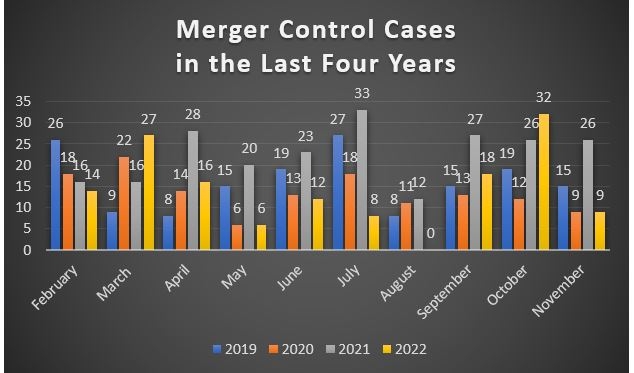December 2002 – In November 2022, the Turkish Competition Board (the "Board") published five reasoned decisions and approved nine merger and acquisition transactions.
At the foreground of Turkish competition law in November was the Board's instigation of three new full-fledged investigations and its conclusion of four on-going investigations, three of which through settlements.

The Board fines hospitals for no-poach and wage-fixing agreements
On 1 November, the Board published the reasoning of its decision concerning the practices in the labour market of 29 medical institutions, including two healthcare associations. The Board initiated an investigation to examine various practices of these medical institutions, mainly fixing the prices offered to medical doctors in private practice for the use of operating rooms, and non-poaching agreements for obstructing the transfer of employees between hospitals. As a result, the Board imposed a total fine of approximately EUR 3 million on 21 of 30 medical institutions.
In this regard, the main points of the allegations indicate that the medical institutions:
- fixed the operating room prices offered to doctors in private practice;
- acted jointly on the fees of various medical services;
- manipulated the rates of the coefficient to be applied during the process of supplementary health insurance;
- agreed to not solicit each other's employees;
- determined the wages to be paid to employees.
The Board conducted its investigation in three cities and reviewed the WhatsApp and e-mail correspondences collected during on-site inspections, as well as interviews with healthcare personnel. In alignment with this evidence, the Board's assessments are as follows:
- The findings gathered during the on-site inspections point out that some of the hospitals colluded to not solicit each other's employees.
- Additionally, some hospitals exchanged information regarding the wages to be paid to their employees and thus determined jointly wages of healthcare personnel.
- Some hospitals aimed to obstruct doctors working in their facilities from resigning, and therefore competing with their former employers, by increasing the operating room prices offered to medical doctors in private practice.
- Such an increase in these prices cannot be explained by the cost increases due to Covid-19, as the operating room prices are much lower if an operation is conducted by doctors working in these hospitals.
- Some hospitals also determined the fees that will be offered to patients for various medical treatments, such as excimer laser treatments, angioplasty/bypass/stent/IVF services or approvals of psycho-technical reports (i.e., the mandatory report to obtain a driver's license that exhibits the mental and psychomotor ability level of the driver).
- Furthermore, the hospitals colluded to influence the coefficient rate to be applied for supplementary health insurance and exchanged competitively sensitive information during this process.
The Board goes "Nutellas" against chocolate-maker Ferrero
The Board conducted a preliminary investigation against Ferrero and its affiliates on the grounds that Ferrero had infringed Turkish competition law by its actions, from the manufacturing to the purchasing, shelling and exportation processes in the hazelnut market. As a result, the Board deemed the findings obtained within the scope of the preliminary investigation sufficient and decided to launch an in-depth investigation against one of the world's major chocolate manufacturers, Ferrero. It is notable that the Board's decision to investigate the famous chocolate producer is significant, as Ferrero meets most of its hazelnut needs from Turkey.
The Board scrutinises undertakings in the cosmetics and personal care industry
Following a preliminary investigation conducted to scrutinise the alleged infringement of Turkish competition law by means of resale price maintenance and restriction of online sales, the Board launched an investigation against six undertakings operating in the cosmetics and personal care products industry: Avon, Farmasi, Kosan Kozmetik (i.e., Flormar), Naos (i.e., Bioderma and Institut Esthederm), Pierre Fabre, and Yöntem Profesyonel Kozmetik, the Turkish distributor of many well-known brands such as Wella Professional, Pantene and Bepanthol.
The settlement mechanism comes to the fore
The Board concluded three on-going investigations concerning resale price maintenance with settlements. In the investigation against the manufacturers of household appliances Korkmaz, Gençler, and Punto, the Board imposed an administrative monetary fine of approximately EUR 666,288 in total, following a 25% discount.
In its investigation against the German manufacturer of high-end domestic appliances, Miele, the Board applied a 25% discount and imposed an administrative monetary fine of roughly EUR 58,147.
In its investigation against the producer of the Turkish ice cream brand Golf, owned by Natura, the Board applied a 25% discount and imposed an administrative monetary fine of approximately EUR 278,185.
The Board investigates each corner of technology
On 29 November, the Turkish Competition Authority announced that the Board has launched an investigation against Hiksan Teknoloji, which delivers products in a wide-ranging spectrum covering mother and baby-care products under the brand name Mochi, as well as Hovbo-branded hoverboards. According to the announcement, the Board will investigate the allegations of resale price maintenance.
The content of this article is intended to provide a general guide to the subject matter. Specialist advice should be sought about your specific circumstances.



